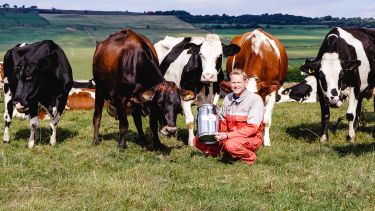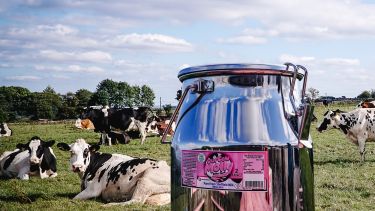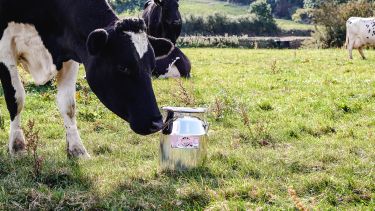By Eddie Andrew, milk producer and director of Our Cow Molly.
Originally published in Sheffield Star - the third in their series on the University of Sheffield’s Made Together programme
Buying a pint of milk from Our Cow Molly isn’t just about the milk – it’s about investing in the environment and the area as a whole - and the Made Together programme is a big part of that.
The University of Sheffield cafes use a lot of milk and we provide a low carbon solution because we are a local farm (on top of one of Sheffield’s seven hills), process the milk on site and use local suppliers for everything, from the bottles to the labels.
We also work on University research into more sustainable ways of doing things.
For example, people usually only get half the story in the press about the problem of cows producing methane but the part where methane breaks down into CO2 & water which is reabsorbed by the grass is often missed. It's a natural gas cycle rather than an environmental impact.
We worked with The University of Sheffield research team which showed that soil on land that had been grazed by cattle actually absorbed 20 per cent more carbon than soil in fields that hadn’t been grazed.
On another project we worked with the University’s Grantham Centre to understand the right balance between using plastic bottles and reusable glass bottles.
Our findings haven’t just affected the way we do things.
We have worked with Co-op and Morrisons in Sheffield to reduce their plastic in the milk aisles too.
Being a University research partner like this is great because it means we can make sure that all our decisions are really well researched, and not just as some knee-jerk reaction, a life cycle analysis is essential to understand the full impact.
It also means you get a chance to make your own suggestions.
I got invited to a two-day plastics conference. At one point they asked if anyone would like to present their idea for reducing plastic so I demonstrated my idea of using a beer hand pull and churn as having the potential to aid the cafes to reduce the milk in plastic we supplied to them to zero.
They liked the idea; the University’s Institute for Sustainable Food funded a prototype and they are rolling it out now.
Once the system’s running in all the University’s cafes it will save 87,000 single-use plastic bottles a year and cut the carbon footprint of milk delivery to campus by over 65 per cent – that’s about 6.5 tonnes of CO2 every year.
It’s fair to say that I see myself as a champion of sustainability.
It would be fantastic to go even further and use the University’s research on capturing methane from slurry to power our delivery vans and farm and also our work to see if we can increase the carbon stored in the fields that dairy cows graze.
For me, Our Cow Molly, and our work with the University’s Made Together programme, is all about trying to make the area the best it can be.



